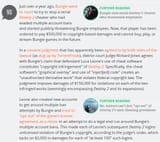>>718760465
That by itself isn't actually surprising. When something is copyrighted, by default, nobody is allowed to do anything with it except yourself. So you typically grant others the rights to use it in certain ways or under certain conditions - e.g. an author will grant some manner of publishing rights to his publisher, which may specify various conditions such as only being valid for a specific print run vs. being perpetual, etc. But these conditions could be anything, e.g. you can give someone the compiled executable for I dunno a video player and say "you can run this executable as often and as much as you wish, BUT you can only do this on one single PC and you cannot copy it to another PC, AND you cannot use it to watch pirated movies". Or in this case, "you can run the executable for my game as much as you want BUT only if you do not use cheating software (plus probably a bunch of other shitty conditions in the eula)".
And if you don't satisfy the conditions for the grant, then the rights you've been granted are no longer valid. And if you haven't been granted rights to use a copyrighted work, then by default you cannot use it in any way. Hence doing so is a copyright violation.
Usually conditions that don't amount to sharing or re-publishing aren't strictly enforced since sharing the software is what directly impacts sales revenue. There's also some consumer protection arguments, especially for physical media (but to some degree with digital media nowadays too), that people have an expectation of being able to do "common sense" things like lending or re-selling secondhand copies so forbidding this is outlawed in various places. But otherwise, there's really no limit to the conditions a license can impose, and certainly "you're not allowed to cheat on the online servers for our game" isn't going to be prevented by any consumer laws.





